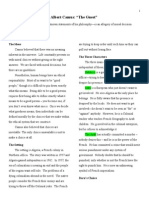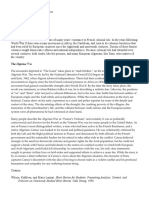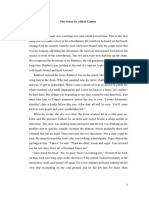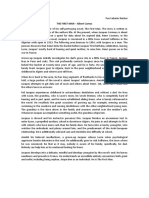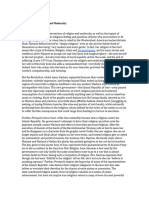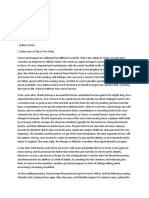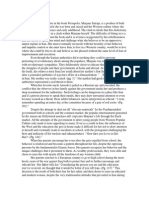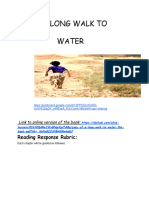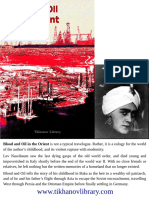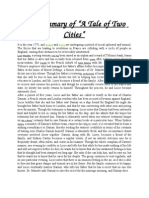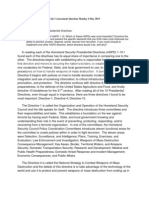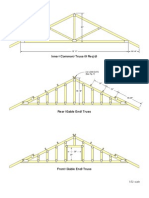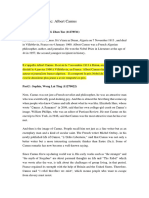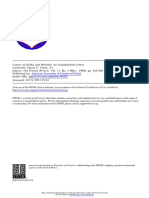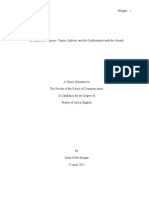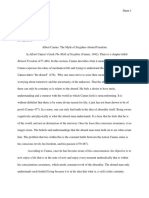"The Guest": Domonick Dixon English 205 Spring 2012
Uploaded by
nwright_bester"The Guest": Domonick Dixon English 205 Spring 2012
Uploaded by
nwright_besterThe Guest
Domonick Dixon English 205 Spring 2012
Undoubted, there is always a reaction or consequence to every decision we make or not make. In the short story The Guest by Albert Camus, the story illustrates many different
Dixon 2
actions and reactions among its characters. Each character in this story is forced to make decisions that ultimately affect another person. Balducci has to make the forced decision to hand over a prisoner, whom he is not sure is guilty or innocent, to a schoolmaster and explains to the schoolmaster that in the mist of war all people are to be prepared to perform all types of jobs. The schoolmaster, Daru, has to make the decision to hand over the prisoner to the European officers in Tinguit and then the Arab prisoner had to make the decision of his own fate in the end. The decisions in which were needed to made tested the morality of two of the characters, Daru and the Arab prisoner. Daru, the schoolmaster of a school located on an isolated plateau high in the Atlas Mountain. Daru, born in Algeria but comes from a European descent, finds himself not really belonging to either side because even though he was born in Algeria he is not a native Arab and not really European either, although that is his background. The Arab prisoner was born in Algeria and is a descent of the Algeria people so he knows who were he belongs. For one to understand both of these characters and why their decisions were so important one has to understand the history between the French and Algerians. It all began, in regards to this story, in 1954 until 1962 a war called the Algerian War. Before the events of the war Algeria was an independent state in the Ottoman Empire and later was taken over by the French colonial government. In the French take over only the French citizens were given skilled jobs and were only allowed to hold offices in the government and education sector. The rebellion all began with a broadcast sent to all Muslims in Algeria urging everyone to participate in restoring the Algerian state, sovereign, democratic, and social, within the parameters of the Islam principles. The broadcast lunched an attack on the military, the police, and the government which lead to the French minister calling for war. The minister did not want
Dixon 3
to accept the people of Algerias protest of not being French but being Algerian not in France control. Each side killed numerous of people including women and children to only ending with no gain on the French side but bloodshed. As time progressed on some of the Algerian people did not agree with what those who started the war were fighting for so they joined with the French army. In the end, after much bloodshed and destruction Algeria was granted their independence. Now here is an Algerian Arab prisoner in the presence of a European man known as the schoolmaster. The relationship of these two men is founded on the war fought between their descents. Daru felt comfortable living in Algeria on the Atlas Mountain even though he had required to be stationed in a foothills village due to the less harsh climate. Daru has always been a person who bends to the will of the French government. The first bending was when he accepted the position on a lonely plateau in which he did not want to be and accepting his living conditions by making himself feel at home. Then teaching Arab pupils French geography, which is mention located on the blackboard in the classroom by representation of three rivers. His last bending was signing the paper from Balducci that release Balducci from the prisoner. After the arrival of the Arab man and the departure of Balducci began a shift in Darus way of thinking. Never wanting to take sides, he found himself having to make a decision whether a man should live or die. He found himself lying awake listening to a silence in the room in which once bothered him only now to surround him with memories of trying to adjust to it. Before the arrival of his guest no one cared to come and check upon him. His only visitors were his pupils or the fathers of those pupils coming for grain. Yet he became content with the idea of being alone when his pupils were unable to attend due to the weather. He looks at the window facing the south and sees the Arab community and looks to the north and sees the
Dixon 4
European community in a way to say he sits in the middle of scale that can be tipped in either direction. The Arab character is considered to be a strange character that dwells in an area where he finds himself to know and understand himself. He does not offer much conversation to Daru which leaves the reader and Daru confused on the subject of the Arab man being guilty or not as well as if the Arab man comprehended what Daru was asking him. I begged the differ on the understanding part because I think the Arab man did understand Daru but he also understood Daru would not understand the whys because he did not understand the Algerian culture so it was a waste of time. This lack of understanding could be seen when Daru was hoping the Arab would escape when he left him alone in the classroom and or during the night while he slept only to his surprise the Arab man did not escape which left an impression of why on Daru. Daru and the Arab man was both faced with a decision and in this decision came an obligation to ones self. Daru choose to allow the Arab man to make the choice for him concerning his own fate while the Arab man had already made the decision long before entering the schoolhouse. The Algerian people lived by a certain code of honor and in this code came certain obligations that had to be followed. First starters, family are the most important unit of the Algerian social system and it defines their social relations. A person is always connected to a family and family comes first before anything else. In the concept of their code, honor is intertwined with a familys good name which gives them their reputation. If someone in the family is honorable the family is honorable but if the individual is shameful the family is shameful. In other words, the behavior of an individual family member is viewed as the direct responsibility of the family. The story never tells the reader or Daru exactly why the Arab man killed his cousin. Only thing the reader and Daru know is the cousin was running away. But
Dixon 5
running away from what? Was he running because he has shamed the family and the other alternative was for the Arab man to kill him? As the story continues the mention of the Arab man name never was asked by Daru. Why? Even though he chooses to treat the Arab man as a guest in the schoolhouse/home he never once took the time to ask his name. This made me wonder if the actions Daru took were just to satisfy his own conscience not the morality of doing what was right. Having the author,
Camus, to only refer to the character as the Arab prisoner, made me think Daru only saw him as an animal not a person. As the Arab man ate Daru only saw his eyes and even though he removed the robe and put away the gun he still saw the man as an animal and hoped the animal would leave him along by running away during the night. As the scenes between the Arab man and Daru continued to unfold the reader would begin to see Daru making every decision concerning the Arab man about himself. He did ask the Arab man what happen but he did not care to ask about his past nor if he had family, just what happened and if he was afraid. This gave me the impression the character was really of no importance, he was just a rain drop in a pond of which consist of Daru trying to discover who he was. By not giving the Arab man a name left him without a personality of his own and only seen by the act he performed when killing his cousin. If the man was given a name then the name would have appeared to be someone bigger than a rain drop. If Camus really wanted the Arab to be considered a dog, it makes perfect sense of why the Arab man did not try to escape during the night. A dog loyal to his master wouldnt run always just like a person who is loyal to the laws of their society would not disobey them every chance they get. So maybe I can consider Daru a loyal dog to the French government. This
Dixon 6
concept could also be seen in the conversation between Daru and the man when the Arab man asked Daru if Balducci was coming back tomorrow and Daru replied he did not know. Then the Arab man informed Daru if he does he wanted him to come along with them. But I do not think Daru saw the Arab man as an animal he just saw himself. In the next morning, Daru and the Arab man begins a journey to deliver the Arab man to the police officers in Tinguit. However, Daru leaves the Arab man on the hill along with money, food and two choices either to go towards freedom or to head in the direction of the Tinguit police and turn himself in. After returning to the hill Daru saw the Arab man headed in the direction of the Tinguit police station to turn himself in. Daru was not sure of why the Arab man had chosen death versus freedom but at that moment he knew it was over. Camus story clearly exemplifies that no matter what choice someone chooses to make, someone else will be affected. As shown, throughout the story, each character is forced to make a decision at one point or another that affects someone else. Balduccis choice was risky and could consequent in the loss of his job, Darus decision to let the Arab choose himself ended well, and the Arabs decision benefited his people. All three characters, in all different ways, made decisions that resulted in some sort of alternate consequence. Works Cited Rosenberg, Donna. World Literature. Columbus: The McGraw-Hill Company, 2004. Print.
